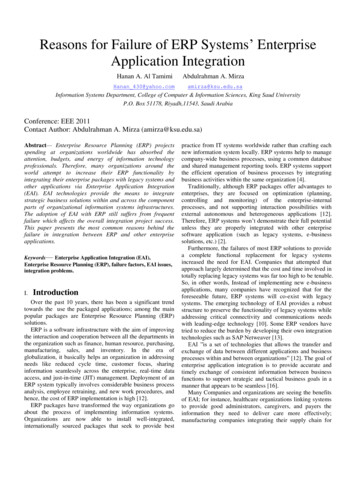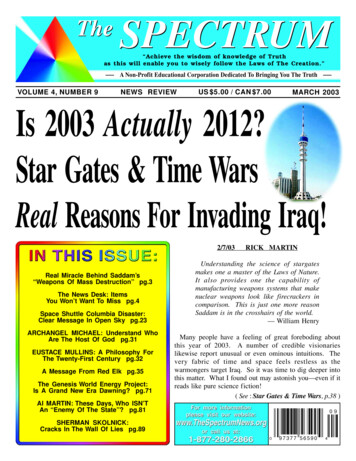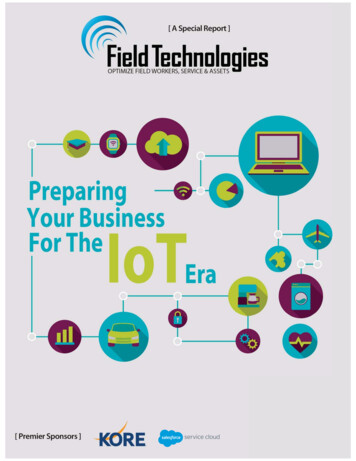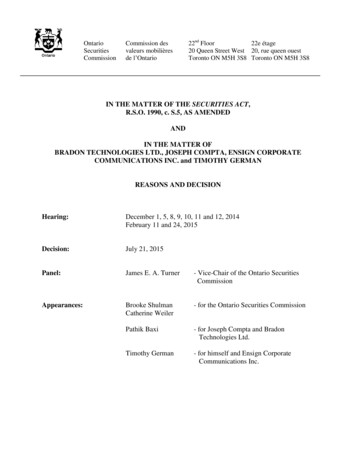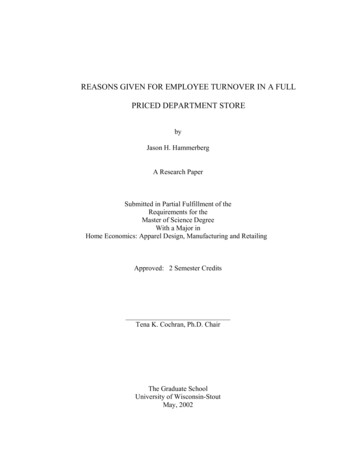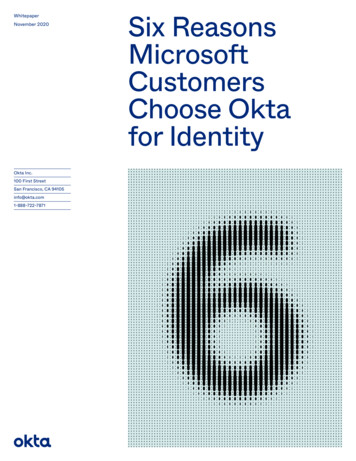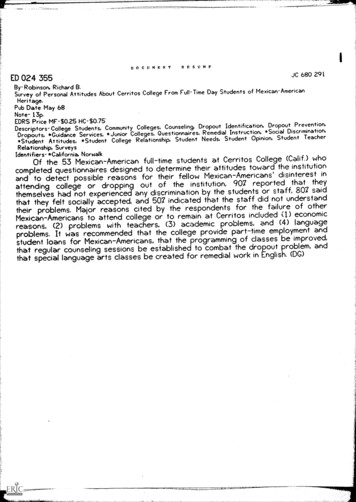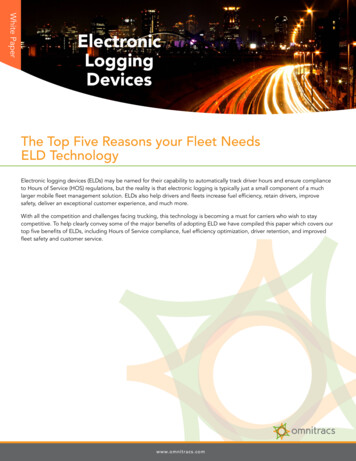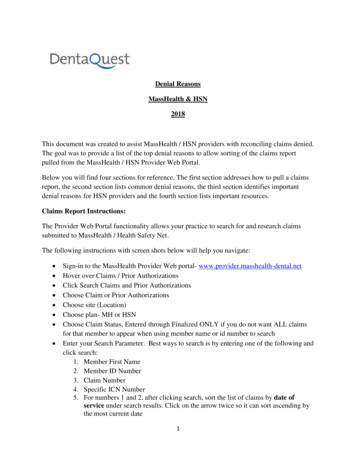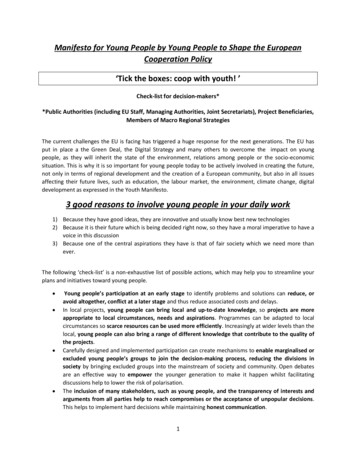
Transcription
Manifesto for Young People by Young People to Shape the EuropeanCooperation Policy‘Tick the boxes: coop with youth! ’Check-list for decision-makers**Public Authorities (including EU Staff, Managing Authorities, Joint Secretariats), Project Beneficiaries,Members of Macro Regional StrategiesThe current challenges the EU is facing has triggered a huge response for the next generations. The EU hasput in place a the Green Deal, the Digital Strategy and many others to overcome the impact on youngpeople, as they will inherit the state of the environment, relations among people or the socio-economicsituation. This is why it is so important for young people today to be actively involved in creating the future,not only in terms of regional development and the creation of a European community, but also in all issuesaffecting their future lives, such as education, the labour market, the environment, climate change, digitaldevelopment as expressed in the Youth Manifesto.3 good reasons to involve young people in your daily work1) Because they have good ideas, they are innovative and usually know best new technologies2) Because it is their future which is being decided right now, so they have a moral imperative to have avoice in this discussion3) Because one of the central aspirations they have is that of fair society which we need more thanever.The following ‘check-list’ is a non-exhaustive list of possible actions, which may help you to streamline yourplans and initiatives toward young people. Young people’s participation at an early stage to identify problems and solutions can reduce, oravoid altogether, conflict at a later stage and thus reduce associated costs and delays.In local projects, young people can bring local and up-to-date knowledge, so projects are moreappropriate to local circumstances, needs and aspirations. Programmes can be adapted to localcircumstances so scarce resources can be used more efficiently. Increasingly at wider levels than thelocal, young people can also bring a range of different knowledge that contribute to the quality ofthe projects.Carefully designed and implemented participation can create mechanisms to enable marginalised orexcluded young people’s groups to join the decision-making process, reducing the divisions insociety by bringing excluded groups into the mainstream of society and community. Open debatesare an effective way to empower the younger generation to make it happen whilst facilitatingdiscussions help to lower the risk of polarisation.The inclusion of many stakeholders, such as young people, and the transparency of interests andarguments from all parties help to reach compromises or the acceptance of unpopular decisions.This helps to implement hard decisions while maintaining honest communication.1
Involving young people would increase trust in the institutions, which is very much needed incurrent hard times for democracy and factual/correct information dissemination.How to best involve young people?1) Identify which of the 12 recommendations listed below you are willing to/can implement2) Identify/Map the target audience to address for each of the recommendations, such as:-Schools? Universities? Technical institutes? Training centres? TIP: Try to reach out to youngpeople who have as diverse backgrounds as possible!-Civil Society Organisations in your area working with young people?-Youth/After-school/Neighbourhood centres? Sport centres/clubs?-Young people’s associations? Youth movements?-Young elected politicians?3) Check the list below with practical tips on how to best reach out to and involve young peoplefor each of the 12 recommendations. Remember: informing young people is a first great stepbut it is not enough. We strongly encourage you to consult, and even better, engage with themin your decision-making process, i.e. making them active agent of your policy and financialchoices as much as possible.4) Consider delegating one or more of the following tasks to your interns, trainees or “InterregVolunteer Youth” (IVY) volunteers, whenever it is appropriate.1.“Increasing the number of online events and meetings via digital platforms, with a cleartimeline and pre-established agenda to facilitate civil society organisations’ and young people’sinvolvement.” Plan a youth-dedicated session in all events you organise or you partner with and if possible associateyoung people to the preparation of this session. This session could be about inviting youngergenerations to share their opinion, successful project stories and suggest practical solutions on relevantcooperation matters. Involve all your youth-related projects in this type of events and meetings on a regular basis. Inform key multipliers such as educational and youth actors (schools, universities, technical institutes,civil society organisations) about all planned events so that they can contribute with speakers andaudience. Offer a digital connection to all your events so that they are more easily accessible (e.g. Facebook orTwitter live, web-streaming, etc ).2.“Planning regular thematic meetings (for example two per year) on Interreg matters withyoung people and European Commission’s staff specialised in territorial cooperation.” Associate young people to the preparation of some sessions of the events2
Allow young people to take active part in thematic sessions organised during your events or organisead hoc thematic events and meetings with young people/associations. Invite European Commission’s staff to your thematic meetings with young people to have an everbroader perspective on cooperation matters.3.“Involving young people in meetings of relevant EU-wide groups and networks, such as theInterreg Annual Meetings, the Interreg Communication Officers Network, and INFORM.” Systematically invite young people, such as your trainees, interns or IVY volunteers, to your internaland external meetings and events, and allow them to express their constructive opinions during theseoccasions; this way they can contribute to shape your policy-making.4.“Enabling young people to encourage their region to apply for the REGIOSTARS Awardcompetition and consider keeping a category dedicated to youth every year.” When promoting the annual REGIOSTARS competition in your area, please encourage youth-relatedprojects to apply so that they can get even higher visibility. This is even more important considering thatone of the cross-cutting criteria for awarded projects is to involve civil society.5.“Further promoting the regular exchanges within existing governance structures like theMacro Regional Strategies, at regional level (e.g. boosting more regular dialogue with young peopleduring the Annual Fora allowing them to participate in the B2B meetings ) and make sure that NGOsare also part of those exchanges.” If you operate within a Macro-Regional Strategy (MRS), make sure to involve all youth-organisations inyour territory in events, consultations and more, as they may not be aware of such cooperationframework. Systematically include a youth-dedicated session/side-event during your MRS Forum with relatedactivities (e.g. competition, project highlights, etc ) to mobilise young people in the long term. EU MRS Presidencies can play an important role in involving young people in the elaboration of theirannual programme.6.“Increasing the knowledge of Interreg in schools and universities: Interreg programmes(Managing Authorities) should create partnerships with local schools and universities to talk aboutInterreg and to make young people more aware.” Plan physical or digital visits/meetings with young students to speak about your job in relation to EUcooperation (Interreg and/or MRS) and do not hesitate to extend the invitation to a colleague from theEuropean Commission (see below). Make sure that you also explain what young people can do to take advantage of and/or contribute tothe world of European cooperation (e.g. get involved by becoming an IVY volunteer or taking part to theManifesto Core Group of young people; participating to your events and competitions; applying forprojects; etc ).3
7.“Encouraging European Commission’s staff to boost their participation to the “Back toSchool/University” initiative and students to pro-actively contact and invite EU staff to go visit theirsschool and university.” Set up physical or digital events/visits/meetings with your local educational institutes (e.g. schools,universities, technical institutes, etc ) and invite European Commission’s staff to show young peoplehow many layers of cooperation there are and disseminate about a positive message around the EU(which is much closer than they think it is!). Promote it via personal social media8.“Creating and disseminating dedicated “edutainment” programme on territorial cooperationvia Interreg projects or with massive open online courses (MOOC) that may interest students andteachers.” If not done yet, produce catchy educational (so-called “edutainement”, i.e. educationalentertainment) for different age ranges (children – teenagers – young adults) on your cooperationprogramme (Interreg programme or MRS) in your local language(s) and disseminate it digitally among alleducational institutes in your area (schools, universities, technical institutes) to increase awarenessamong young people of such cooperation instruments.TIPS: 1) you can use your TA budget for this; 2) you may want to involve youth or educationorganisations on the ground when designing this material to make sure it corresponds to what youngpeople are attracted to.9.“Encouraging each Interreg programme to plan more calls more easily accessible by youngpeople with simpler rules and a dedicated budget.” Design, launch and promote among other Interreg programmes and your European Commissioncounterparts at least one youth-specific call for projects in 2021-2027 targeting young people and allowfor simpler rules so that they can have easier access to Interreg funding. Encourage young people to launch projects on every priorities of your Interreg programme (or inMacro Regional Strategies work programme). In particular on environmental issues, employment andsocial priorities.TIP: you can also set up a “Participatory Budgeting” processes in which young people decide how toallocate part of your EU budget. Participatory budgeting allows citizens to identify, discuss, and prioritisepublic spending projects, and gives them the power to make real decisions about how money isspent. The principles of participatory budgeting can be applied in the selection of projects or thepreparation of grant applications by beneficiaries. All this to be applied for the benefit of young people.Youth could be involved in the selection of projects, either by being represented in steeringcommittees/monitoring, or they could be brought in as experts to assess the “youth aspect” of certain4
project applications related to e.g. labour market and education. Another way to make Interreg fundingmore accessible to youth is to set up for example people-to-people projects. This could be done througha Small Project Fund, or through the provisions on “projects of limited financial value”, which isobligatory for 2021-2027 and could provide a simplified administrative procedure.10.“Inviting young people in meetings and enable them to actively participate to the monitoringcommittees.” Systematically invite young people (e.g. your trainees, interns, IVY volunteers) or youth associations inyour area to your Monitoring Committees and allow time and space for their active participation.TIP: you can also appoint, invite and select young people to a consultative or decision making forum inorder to support or control the planning, implementation or monitoring of a program or project, similarlyto the current system of Monitoring Committees Consider “crowdsourcing” which is used to exploit the power of community (in this case, youngpeople) in order to gather or process information. It can be an effective tool to collect ideas from abroad circle of young people and youth associations but also to receive information that can help tomonitor implementation or assess the impact of programs and projects. For example, “At the School ofOpenCohesion” is a project that was developed to involve high-school students in the monitoring of EUcohesion policy funds.TIP: check “Participedia” and “Consul” as interesting platforms to easily involve young people!11.“Mobilising resources for the Interreg priority objective related to boosting skills and tacklingyouth unemployment” Make sure to mobilise resources (e.g. calls for projects) to tackle youth unemployment, in line withInterreg priorities. Play a more active role in offering job opportunities to young people in border areas by setting up ajob offer platform in multiple languages, in partnership with local companies, organisations andeducational and training institutes.12.“Boosting more EU inter-institutional and multi-governance relations, dialogues and actionson young people’s role and needs linked to Interreg. Invite young people and youth organisations from your area to external events organised by other EUpartners, including the European Commission. Disseminate the Manifesto within and outside of your institution/organisation to involve as manyactors as possible in making them aware of the importance and the benefits of involving young people inpolicy making. Work hand in hand with young people on your communication strategy: young people could be yourambassadors. They would help reach out other young people.5
organising competitions like awards/hackathons/challenges between Interreg programmes or projectsTIP: use - and disseminate - the Manifesto communication toolkit for social media communicationFOR ANY QUESTION, DOUBT OR NEED SUPPORT (e.g. contacts of young people in your area), do nothesitate to uWe are also very happy to be informed about all your Manifesto-related actions and activities, thanks!6
development as expressed in the Youth Manifesto. 3 good reasons to involve young people in your daily work 1) Because they have good ideas, they are innovative and usually know best new technologies 2) Because it is their future which is being decided right now, so they h
